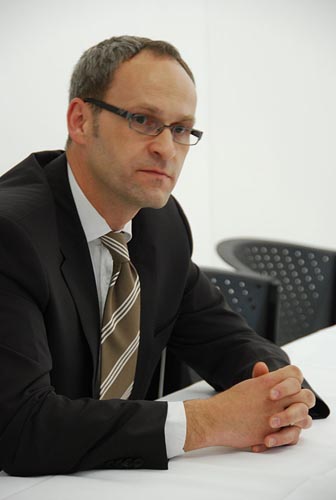|
 |
|
Tim Dawidowsky, who is responsible for Siemens VAI Casting and Rolling business, attends the 4th Media Summit Metals and Mining Technologies in Essen, Germany, on May 11 (CHEN RAN) |
Siemens VAI will pay special attention to emerging markets like China and India, and will continue its investment there, according to the company's top management.
Tim Dawidowsky, who is responsible for Siemens VAI Casting and Rolling business, made the remarks at the 4th Media Summit Metals and Mining Technologies in Essen, Germany, on May 11.
China and India nowadays produce more than half of the world's steel. In a speech, Dawidowsky outlined four reasons Siemens VAI should increase local value in the emerging markets driven by China and India: to participate in the growth potential, have a say as a local market participant, develop technologies that meet specific market requirements, and retain competitiveness, adding that "success requires the integration of local activities in the global network."
Global crude steel output fell by 8 percent in 2009 to 1.2 billion tons, according to the World Steel Association. China was one of the few exceptions—according to the National Bureau of Statistics, last year China's crude steel output and steel output reached 568 million tons and 696.26 million tons, respectively, growing 12.9 percent and 15.2 percent. Total steel production in the first three months of 2010 rose by 24.5 percent to 158 million tons, 46 percent of the world total, statistics from the World Steel Production Report showed.
"The (emerging) market is attractive, and the volume of the market is attractive, too," said Werner Auer, CEO of Siemens VAI.
"China is the market and will continue to be the market," Dawidowsky echoed.
Dawidowsky said that all growth over the next five years would take place in emerging markets.
"The strategy of moving to countries like China and India is not just participating in the growth," he said. "It gives us access to additional market segments where we have been active up till now."
The key to success, in Dawidowsky's eyes, is "becoming local," which means "close to customers and local requirements."
Cast and roll as well as long rolling are major business segments that Siemens VAI plans to expand throughout China; the products that the company has transferred to China include reversing cold mill, finishing lines, aluminum foil mill, caster segments, shapetech products and bar mills.
Currently, Siemens VAI has three manufacturing facilities in China, including one joint venture with Baosteel in Shanghai. The other two are in Shanghai and Taicang, Jiangsu Province, with more than 1,000 employees in sales, engineering and manufacturing.
"Since the economic crisis, the competition in plant engineering has intensified significantly," Auer said. "Chinese and Indian companies are bringing their own plants onto the market successfully and ever more frequently."
According to Auer, China and India want to produce, above all else, steel with simpler and cheaper plants to develop their infrastructure. Therefore, almost half of the total world investments of almost 21 billion euros are already being invested in such plants
"With an investment of double digit million euros over two to three years, we will recruit 200 engineers/project managers and 200 shop floor people in China by the end of 2011," Dawidowsky told Beijing Review. "We cannot buy; we have to win markets and customers."
(Reporting from Essen, Germany) | 